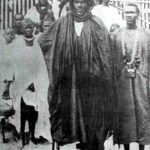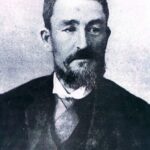AGGREY, J.
- 3 Min Read
John Aggrey (also Aggery, or Egyir) 1808-1869, chief of Cape Coast from 1865-66, was the first traditional ruler to organise systematic protests against the British administration on the Gold Coast.
He was born in 1809, the son of Joseph Aggrey, himself the chief of Cape Coast from 1856-65. John Aggrey did not have any formal education, but learned to read and write. By 1840 he was taking an interest in the events which were to lead to the formal conclusion of the Anglo-Fante alliance.
The Anglo-Fante alliance had had its inception in the 1820s, and culminated in the Bond of March 6, 1844. The Bond did not invest the British with any powers beyond helping the chiefs in the conduct of certain judicial processes. British officials, however, gradually went beyond the terms of the Bond, and began to establish courts and administer justice in the name of the Queen.
When Aggrey was installed in 1865 as ‘King’ of Cape Coast, he challenged the British assumptions by establishing his own court for Cape Coast. The British governor, Richard Pine (term of office 1862-65), tried to get him to agree to the right of appeal from his court to British courts, but Aggrey refused, maintaining that British jurisdiction was confined to British possessions only, and that the British could not interfere in the affairs of the Africans.
Aggrey constantly referred in his protests to the outrageous behaviour towards himself and his people of the Lieutenant-Governor, Colonel Edward Conran (term of office 1865-67), and the Cape Coast authorities. He had complained of Conran’s lack of respect for his authority as “King of Cape Coast.” In September 1865 he again complained, concerning an attack on the people of Cape Coast by the West Indian garrison of the Castle, during a riot which occurred on September 4.
It was the general resentment of the British jurisdiction on the coast which strengthened Aggrey’s hand. The local British position was further weakened by the recommendation of a British parliamentary committee in 1865 that the British should withdraw from the Gold Coast. Aggrey knew of the recommendation, because he had sent two commissioners, Joseph Martin and D. L. Carr, to testify before the committee in London.
They, together with Thomas Hughes and other educated Africans, helped the chief in his protests. Before long it became clear that, feeling that the British had not kept their part of the bargain struck in the Bond of 1844, Aggrey and his advisers were demanding self-government.
The British, who were impatient with educated Africans, felt that Aggrey had gone too far. Conran arrested Aggrey in December 1866, and sent him to Sierra Leone for trial. But the British themselves realised that they had no power to proceed with case. Samuel W. Blackall, governor-in-chief of the British West African Settlements, therefore tried in vain to secure Aggrey’s submission, first by persuasion, and then by threats.
Aggrey remained defiant even in Sierra Leone, until March 1869 when his health failed. In the same year the British hurriedly repatriated him, he renounced his claim to be king on returning home, and he died in Cape Coast. By his resolute stand against foreign oppression, John Aggrey was a worthy forerunner of the 20th century Gold Coast nationalists.
FRANCIS AGBODEKA




